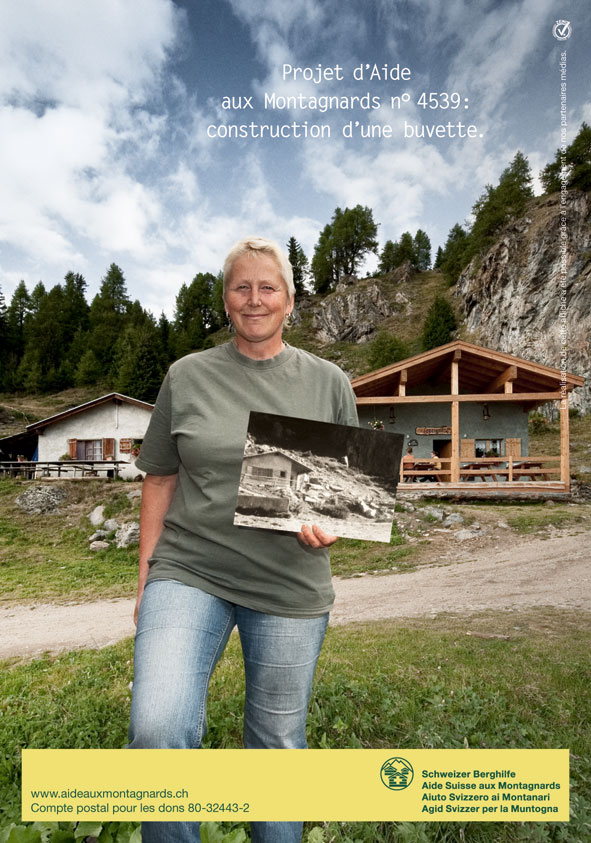
Investment urged for Swiss mountain farms

Investing in mountain farms is crucial to stem the steady flow of people packing their bags and leaving high-alpine regions, warns a Swiss foundation.
Swiss Mountain Aid last year funded over 500 livelihood projects in the Swiss Alps to the tune of SFr20 million ($18.9 million) to help people carve out an existence in the tough alpine environment.
“Huge solidarity is essential to keep the mountain regions alive,” Hugo Höhn, director of Swiss Mountain Aid, told a media conference in Lausanne on Thursday.
An estimated 60,000 people live in high-alpine regions in Switzerland, of whom around 7,500 work as farmers. But the overall number continues to fall by 1.5 per cent a year as people leave for towns and cities in the valleys.
“Only an adequate social and economic environment will stop the mountain regions from emptying,” said executive board member Marcel Sandoz. “It’s essential they can secure decent salaries to be able to live where they have their roots.”
Double handicap
The private foundation, which was started by Swiss army officers in 1943, is this year focusing its efforts on helping mountain farms gear up for the future.
“Like the farmers from the central plateau region, mountain farmers have been hit hard by the crisis in the agriculture sector, with a drop in prices and income,” said Willy Streckeisen, from Swiss Mountain Aid. “But they suffer a double handicap due to their tough living conditions.”
From more than 92,000 farms nationwide in 1990, there were just 61,800 left in 2008. Swiss farmers have also suffered a drop in income of at least ten per cent in the past decade.
Mountain farmers may receive a share of the SFr2.5 billion ($1.96 billion) in direct payments or state subsidies every year, but they still struggle, says the foundation.
Many survive only because they have taken up a second occupation.
Multi-pronged strategy
Despite all this, the foundation is convinced mountain farming has a future in Switzerland.
Agriculture is anchored in the Swiss constitution and it’s strongly linked to tourism, said Streckeisen.
“If mountain farmers abandoned their farms, in the space of one generation the land would turn into forest, and when that happens tourists won’t bother coming; this would be a considerable economic loss for Switzerland,” he said.
The foundation has devised a multi-pronged strategy to try to slow the exodus from the mountains: rationalising and regrouping farm workers, specialist products, regional farming approaches and collaborating with other sectors, like the tourist industry.
At Rona in canton Graubünden the agency is currently supporting a project to merge three farms and farmland and build a joint cheese farm to lower production costs.
At Hohkein in the Bernese Alps a new cheese farm is being built aimed at producing high-quality products. A similar top-end cheese project was completed last year at Robiei farm in canton Ticino.
“We want to give an added-value to these mountain products,” said Streckeisen. “In Ticino they don’t need to advertise their cheeses as they are so much in demand.”
Cheese and coffee
For the past 32 years Lise Es-Borrat has lived and worked on the Loveignoz pasture high up in the Hérens Valley in canton Valais where she looks after her 90 head of cattle and produces cheese. Despite her hard work every year she struggles to make ends meet.
But with support from the foundation she recently built a small café next to her farm that now attracts hikers and tourists from the region.
“Without the café we wouldn’t have been able to maintain this farmland,” she explained.
Simon Bradley, swissinfo.ch
Agriculture in Switzerland is among the European average when it comes to the number of the number of people it employs (5.4% of the active population) and its added value (1.2% of GDP).
Animal production accounts for nearly three-quarters of Swiss agricultural production. Swiss farmers produce about three-fifths of the food consumed in the country.
From more than 92,000 farms in 1990, there were just over 61,800 left by 2008. Swiss farmers have suffered a drop in income of at least ten per cent in the past decade.
According to a 2006 study by the Agroscope agricultural research centre in Tänikon and the Zurich-based consulting group Infras, one-fifth of alpine farms could go out of business over the next ten years.
Swiss farmers need SFr2.5 billion ($1.96 billion) in direct payments or state subsidies every year. Some estimates suggest that supporting farming costs the Swiss taxpayer SFr4 billion annually.
The agricultural sector is estimated to generate SFr2.9 billion in income in 2009. A five per cent drop in output compared with the previous year has been triggered mainly by the fall in prices for products such as milk and cereals.

In compliance with the JTI standards
More: SWI swissinfo.ch certified by the Journalism Trust Initiative





























You can find an overview of ongoing debates with our journalists here . Please join us!
If you want to start a conversation about a topic raised in this article or want to report factual errors, email us at english@swissinfo.ch.